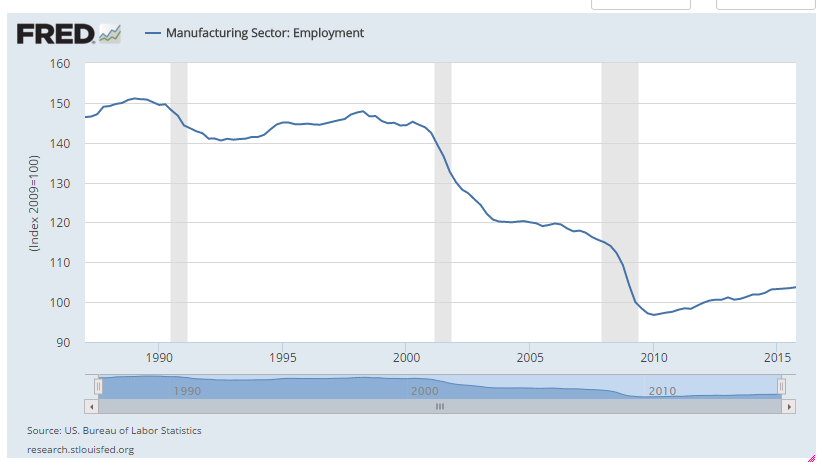"Most of the advanced economies of the world have
Post# of 65629
Quote:
"Most of the advanced economies of the world have long moved into a new, postindustrial phase of development," wrote Dani Rodrik of Harvard University’s John F. Kennedy School of Government in a November 2015 paper.
"These economies have been deindustrializing for decades, a trend that is particularly noticeable when one looks at the employment share of manufacturing. … In the United States, manufacturing industries’ share of total employment has steadily fallen since the 1950s, coming down from around a quarter of the workforce to less than a tenth today." (We looked at this question previously here.)
Indeed, in February 2003, the cover of a special issue of BusinessWeek magazine asked, "Is Your Job Next? A new round of globalization is sending upscale jobs offshore. They include chip design, engineering, basic research -- even financial analysis. Can America lose these jobs and still prosper?"
That was about six years before Obama took office.
In fact, when PolitiFact asked McMillan whether this pattern predates Obama, she emailed back, "Hell yes," followed by 12 exclamation points.
In her paper, McMillan wrote that employment declined modestly in the 1990s in such labor-intensive industries as textiles and became "precipitous" with the advent of the Internet in the late 1990s. She finds that both technological advancements and a growing role for an overseas labor force played a role.
The ability to conduct work overseas "has led to fundamental reorganization of the global supply chain, with detrimental effects on domestic manufacturing workers and surging corporate profits," she wrote.
The decline in U.S. manufacturing employment between 1987 and 2015 -- starting 22 years before Obama took office -- can be seen in the following graph:
http://www.politifact.com/truth-o-meter/state...-barack-o/
Choke on the following, righties. LOL!

So jobs have clearly been moving overseas for many years, even if the trend predated Obama and occurred for reasons other than his policies.
Still, it’s worth making a few additional observations:
• Manufacturing jobs have been increasing under Obama. While the rise in manufacturing jobs under Obama hasn’t come close to wiping out the declines of previous decades, the number has risen rather than fallen since 2010 -- the first sustained increase since at least the 1990s
There is at least anecdotal evidence of "onshoring" -- the return of jobs to the United States. For instance, 177 "foreign-trade zones" -- special manufacturing and assembly facilities located in the United States -- serve more than 3,000 companies, employ 390,000 workers and handled $835 billion in merchandise, almost two-thirds of it domestically sourced, according to the National Association of Foreign-Trade Zones.
• Along with job losses, there have been job gains. Overall, productivity has been improving in the United States. "Specific industries and job categories have been hard hit, sometimes very much so," Sturgeon said.
At the same time, many are benefiting, including "in ways they may not even notice, such as new types of work and jobs, greater product variety and lower prices."
Sturgeon is among those who argue that Cruz’s answer is too simplistic.
"The debate right now is playing to people’s fears and discontent in ways that are nearly devoid of fact or serious consideration of the trade-offs or remedies," he said. Where it comes to Obama’s role, he said, "this is a broad structural issue and not something Obama invented or could do much to change, or even do much to mitigate with an uncooperative Congress."
Our ruling
Cruz said that Obama has "been presiding over our jobs going overseas for seven years." While the pattern has been occurring under Obama, it is hardly new or unique to Obama. We rate the statement. Mostly False.
 (2)
(2) (0)
(0)